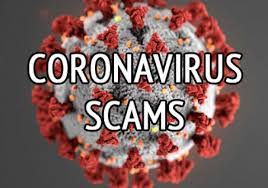State AG Warns of Coronavirus Scams
Mike Seals - April 3, 2020 10:23 am

State Attorney General Mike Hunter today issued a warning about potential fraud to Oklahomans awaiting their economic impact payments from the federal government.
The economic impact payments are part of the $2.2 trillion Coronavirus Aid, Relief and Economic Security (CARES) Act. Signed by Pres. Donald Trump in March, the act included funding for emergency assistance to Americans and businesses financially struggling during the COVID-19 pandemic.
Attorney General Hunter said the economic impact payments provide much-needed relief for those struggling, but create another opportunity for scammers attempting to cash in or steal identities.
“The majority of individuals who qualify for the one-time payment don’t have to do anything except wait for the money to be deposited in their bank accounts or checks will come in the mail,” Attorney General Hunter said. “Although some details are still being finalized, I encourage Oklahomans to stay patient. Only get information from trusted sources, ignore text messages or emails claiming to expedite the process and contact my office about any suspicious offers. Regrettably, these scams, and more, are already beginning to surface. Oklahomans who are anxiously awaiting this money must, nevertheless, be on high alert.”
On Monday, the Treasury Department and the Internal Revenue Service announced the distribution of payments will begin in the next three weeks. The payments will be automatically delivered, with no action required for most individuals. However, some taxpayers who typically do not file returns will need to submit a simple tax return to receive a payment.
To learn about eligibility and review more resources on Coronavirus tax relief, visit: https://www.irs.gov/coronavirus.
The Attorney General’s Consumer Protection Unit offers the following advice for avoiding fraud and scams related to the Coronavirus:
- Federal agencies will not email or text individuals regarding Coronavirus economic impact payments. If an unsolicited email or text comes from a federal agency with information about the money or anything else related to the Coronavirus, it is a scam that could infect someone’s computer with malware or ransomware.
- There is no fee to receive stimulus money. If someone says there is, they are a con artist, and you should terminate the conversation.
- No one can expedite payments. Do not trust anyone claiming to be able to perform this service.
- Stay updated by visiting the U.S. Department of Treasury at https://home.treasury.gov/, or the IRS at https://www.irs.gov/.
For more resources on Coronavirus scams and contact information for the Attorney General’s Consumer Protection Unit, click here: https://bit.ly/2V1CCob.



